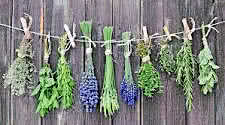In Depth Herbal Study: Herbal Supplements Key in Health & Fitness Lifestyle

Get the Facts about Herbs for Proper Health
We're talking here about herbal supplements, a form of alternative medicine that more and more people are trying. Proper administration is
crucial, however, and a supplement labeled "natural" doesn't mean it's entirely safe and free of side effects.
In the Journal of Emergency Nursing, researcher Thomas Moss, MD, discusses some of the more popular herbal supplements and certain dangers
associated with their use. He also recommends selecting herbs manufactured by reputable companies to ensure that you get a quality product.
1. Chamomile may cause an allergic reaction if you're sensitive to ragweed.
2. St. John's wort may cause you to break out in a rash; also avoid taking this herb without a physician's okay if you take monoamine oxidase inhibitors (Nardil, Parnate) or selective serotonin re-uptake inhibitors (Prozac, Zoloft) for depression.
3. Comfrey, chaparral, mistletoe and germander may cause altered liver function/hepatoxicity.
4. Guarana, cola nut and mahuang are associated with hypertension and rapid heart rate.
5. Licorice may cause hypokalemia (a condition of extreme potassium depletion).
6. Feverfew is associated with mouth ulcers in up to 11% of users.
7. Ginkgo biloba can be associated with mild gastrointestinal distress & an eye condition called subconjunctival hemorrhage.
8. Peppermint can cause heartburn and acid reflux if you're prone to them.